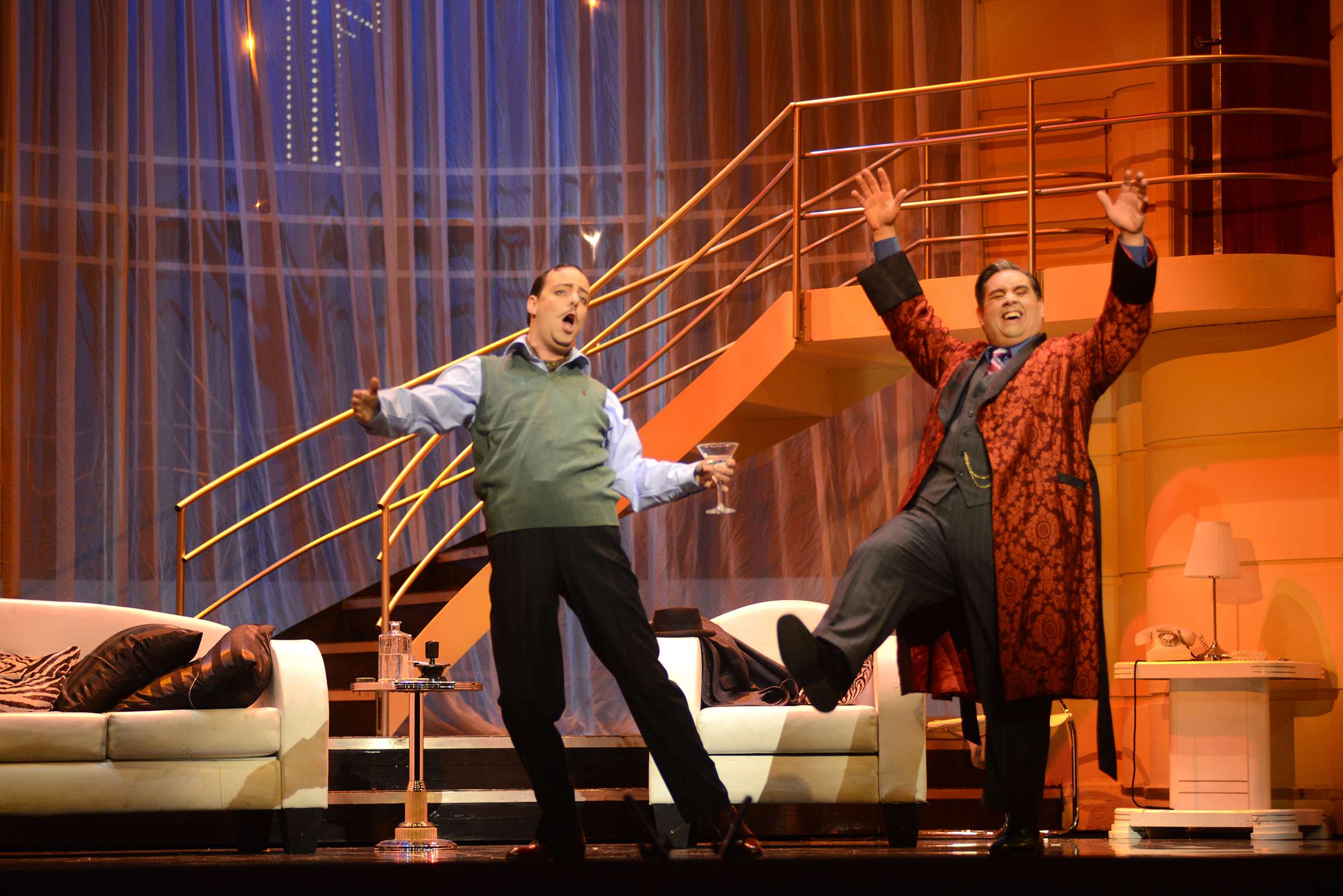|
Back
A Handsome Fledermaus Lacked Sizzle in Montreal Montréal
Salle Wilfrid-Pelletier, Place des Arts
01/26/2013 - & January 29, 31, February 2, 2013
Johann Strauss II: Die Fledermaus
Marc Hervieux (Eisenstein), Caroline Bleau (Rosalinde), Marianne Lambert (Adèle), Dominique Côté (Falke), Alexandre Sylvestre (Frank), Thomas Macleay (Alfred), Emma Parkinson (Prince Orlofsky), Martin Drainville (Frosch/Majordomo), Aaron Ferguson (Blind), Johathan Bédard (Ida), Chantale Nurse (The Guest)
Chœur de l’Opéra de Montréal, Claude Webster (Chorus Master), Orchestre symphonique de Montréal, Timothy Vernon (Conductor)
Oriol Tomas (Director), Richard Roberts (Sets), Angus Strathie (Costumes), Anne-Catherine Simard-Deraspe (Lighting), Noëlle-Emilie Desbiens (Choreographer)

D. Côté, M. Hervieux (© Yves Renaud)
The last time I saw Die Fledermaus, the action was set on and around the wing of a World War II aircraft that had crashed into a mountain top. The singers spent most of the evening throwing pink, rubber fish at each other. The booing and catcalls never let up. As may be expected, that was in Germany. Thankfully, the version I saw Saturday at the Opéra de Montréal (original production from Opera Australia) was largely set in handsome, 1930s Montreal mansions (designed by the Australian Richard Roberts). The two-story living room of the Eisensteins resembled the art deco home on Pine Avenue of the former Canadian Prime Minister Pierre Elliott Trudeau (the lighted, iconic cross on Mt Royal was visible beyond the living room windows). The gigantic, gold-hued ballroom at Orlofsky’s was studded with gorgeous, multicolored costumes by the Australian Angus Strathie. Soprano Chantale Nurse as the guest, “Josephine Baker”, singing “J’ai deux amours” (Montreal and Paris), wore a tight, gold-satin gown that was even upstaged by a white-plumed headdress larger than herself! The down-at-the-heels police precinct was what one would expect to find on Saint Mark’s Street in an edgy section of downtown Montreal—now as well as in the 1930s.
Stage direction by Canadian Oriol Tomas was tight, well timed and with plenty of comic action. The characters’ attempts to out-maneuver each other in Act 1, and Alexandre Sylvestre’s antics as the drunken police officer confronting Martin Drainville as Frosch the morning after the ball brought down the house.
The singing and dialogue, in French with a few token lines in English (presumably for the gratification of the English-speaking minority in the audience), generally equaled the production values. Caroline Bleau as Rosalinde (all principals were Canadian) sang with assuredness and a pure tone, impressively prolonging many notes without a hint of strain. Marianne Lambert was perfect as Adèle. Her coloratura was firm and bright and her acting filled with verve and confidence. Marc Hervieux as Eisenstein sang and acted with robustness and vigor, although his spoken parts were at times indistinct. The standout was Dominique Côté as Dr Falke (The Bat). His warm, mellifluous baritone projected effortlessly to the back of the parterre, and his thespian skills lit up the stage. The production included two trouser roles–mezzo Emma Parkinson sang Prince Orlofsky with aplomb, although sometimes a little too restrained, and the gender of Johathan Bédard as Ida was betrayed by his enormous height and gravelly baritone!
The major drawback was the performance of musicians from the Orchestre symphonique de Montréal conducted by Timothy Vernon. Founding artistic director and conductor of Pacific Opera Victoria, Vernon has conducted many outstanding productions with Opera McGill here in Montreal. On Saturday, however, with a greatly reduced orchestra, the music failed to sizzle. From the overture onward, despite deft conducting, the music sounded thin and amateurish, and rarely equaled the passion and drive of the singers. It’s effervescence, sparkle and bubbles that make great champagne!
Earl Arthur Love
|